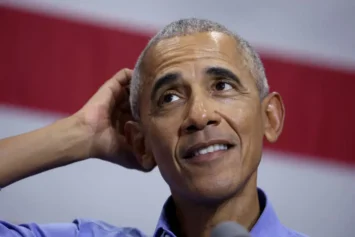I had brunch last weekend, before Monday’s debate, with a veteran journalist friend, who has covered defense, politics, the White House and has been a foreign correspondent with experience in a war zone.
We talked about a wide range of things and then as we turned to the 2012 presidential campaign he noted that the Tea Party wing of the Republican Party has been awfully quiet about Mitt Romney’s flip-flop on economic issues.
“The old guard must have bought ‘em off,” my friend said. “They are so desperate to win they’ve been convinced to keep quiet. Think about it. Romney has repudiated almost everything they stand for and they’ve said nothing.”
In fact, the Tea Party has been so quiet that I nearly forgot about its existence.
Washington Post columnist E.J. Dionne has argued that the Tea Party was never really serious.
In fact, Dionne contended, the Tea Party was created to help the GOP recover from losing the White House in 2008 and try to increase its numbers in both houses of Congress by beating up on the president and making hay in the 2010 off-year elections.
Republicans took the House and while the Senate continues to be held by Democrats, they were able to be disruptive enough to make the Democrats look weak and keep the presidential race close this year, Dionne said.
Now, however, the Tea Party is too far right for most Americans and has jumped the shark as a general election strategy, Dionne argued. It’s time to run in the middle, which is probably more in line with the true Romney philosophy.
“Mitt Romney would not be throwing virtually all of his past positions overboard if he thought the nation were ready to endorse the full-throated conservatism he embraced to win the Republican nomination,” Dionne wrote for Real Clear Politics.
“If conservatism were winning, does anyone doubt that Romney would be running as a conservative? Yet unlike Ronald Reagan and Barry Goldwater, Romney is offering an echo, not a choice. His strategy at the end is to try to sneak into the White House on a chorus of me-too’s.
“The right is going along because its partisans know Romney has no other option,” Dionne wrote. “This, too, is an acknowledgement of defeat, a recognition that the grand ideological experiment heralded by the rise of the tea party has gained no traction. It also means that conservatives don’t believe that Romney really believes the moderate mush he’s putting forward now. Not to put too fine a point on it, but if the conservatives are forgiving Romney because they think he is lying, what should the rest of us think?”
So which Romney would America get if he were to win?
That, my friend said, is the $64,000 question.
“In congressional elections, the tea party probably helped Republicans win more conservative districts than they otherwise would have. But when you move up to the Senate, where you need to have a broader appeal, the tea party foisted several terrible candidates on the GOP, causing them to lose at least three winnable races. And now, in a presidential election, which requires the broadest appeal of all, Mitt Romney’s subjugation to the tea party has all but ruined him,” Kevin Drum wrote in a blog for Mother Jones last month.
Drum argued that the Tea Party forced Romney to run too far to the right in order to win the nomination, denying him the ability to move back toward the center without looking disingenuous.
The election was destined to be close anyway, many pundits have said, because the economy has not come roaring back. The conventional wisdom, though, has been that as long as there is some improvement, the race is likely to be close enough to give the incumbent a scare, but usually not likely to turn him out of office.
So the Tea Party may have overplayed its hand and figured the best thing it could do to help put a Republican back in the White House is to do nothing.
Whether Romney will tack hard to the right or be the centrist he has been on the campaign trail of late is anyone’s guess, but he appears prepared to go either way.
And don’t rule the party out completely.
Kim Dixon of Reuters, in a recent article, suggested that the right wing is merely lying in wait to initiate its agenda come January 2013.
Romney, Dixon wrote, “likely would look to fellow Republicans in Congress to fill in the blanks of a framework to slash rates and pare deductions as part of an overhaul of the U.S. tax code.”
Romney campaign officials told Reuters they have been consulting with congressional Republicans and that Rep. Dave Camp (R.-Mich.), chairman of the tax-writing House Ways and Means Committee, is working on plans that could move forward if Romney wins.
The Tea Party’s silence does not mean it has been beat down, necessarily. It could mean it is willing to take one for the team, if the result is a Republican wins the White House.
Jackie Jones, a journalist and journalism educator, is director of the career transformation firm Jones Coaching LLC and author of “Taking Care of the Business of You: 7 Days to Getting Your Career on Track.”


